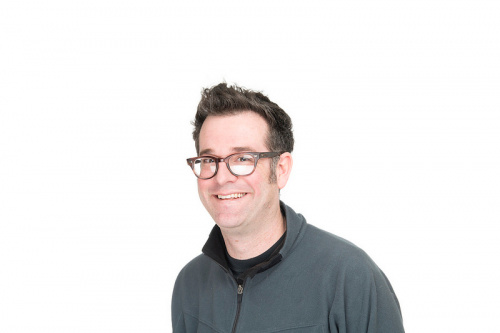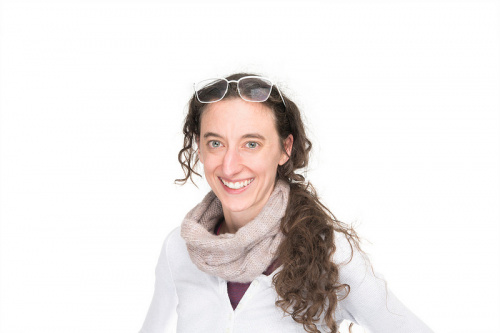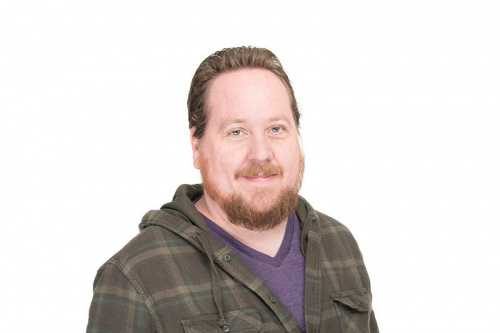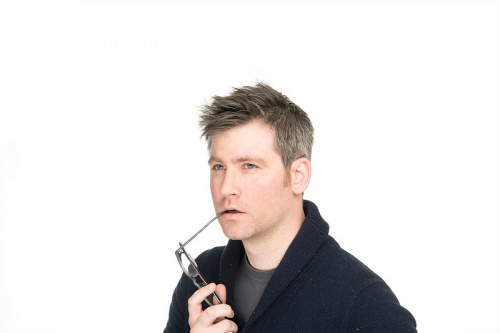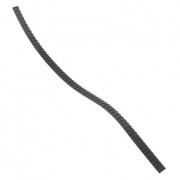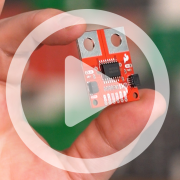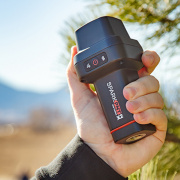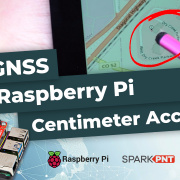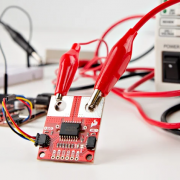Chattanooga Public Library 4th Floor and the University of Tennessee at Chattanooga Studio
We hosted some representatives from cutting-edge library programs in Tennessee to play with hardware and share what they're up to!
One of the things SparkFun's Department of Education is most interested in is the changing role of libraries in the face of constantly-accelerating technology. We believe libraries hold a unique position as the trusted disseminators of democratized information, and they have the capacity - in the 21st century - to provide widespread access to digital literacy and the tools that will most benefit their communities.
We've taught classes all over the country to libraries interested in adopting or offering SparkFun kits and hardware to the next generation of library users, and we've provided equipment and tools to several libraries across the US that are instituting hands-on makerspaces in their buildings. A couple weeks ago we were lucky to host four librarians from Chattanooga, TN - Nate Hill and Meg Backus from the Chattanooga Public Library 4th Floor program, and Jason Griffey and Bo Baker from the University of Tennessee at Chattanooga's new library space (the Studio) - who were able to visit thanks to a sponsorship from the Benwood Foundation, on an innovation grant received by the 4th Floor.
Chattanooga is at the forefront of the library revolution, and our visitors have been charged with changing the face of their respective institutions to provide hands-on access to modern, relevant technologies while maintaining the integrity of the library tradition. It's no small task, but you'd be hard pressed to find a more passionate group of administrators, and we were honored to learn more about what's going on in Tennessee from some kindred spirits!
Can you share your background, interests, and some favorite past or current projects?
Nate: I've worked in public libraries since 2000. During that time I've worked in a great variety of places, from New York to California, and now Tennessee. I have an art and design background, but sort of fell into the library thing by chance. I believe that my background still influences the way I approach problem solving and community organizing was a librarian and technologist.
Meg: My background is in the humanities, but part of librarianship's appeal was how it affords a whole host of interests and pet projects. My favorite past project is probably the LibraryFarm, a project I did in an Upstate New York library. We plowed the library's land and publicly farmed it, learning about and hacking the science and social systems around food.
Fun current projects include (but are not limited to!) an apron uniform for the 4th Floor that doubles as a help system capable of alerting staff to service needs, an installation of needle-felted fireflies that simulates a specific species of Tennessee lightning bug (Photinus carolinus--they are the kind that synchronize), and the Awesome Box, a special return bin for library materials that lets people declare and share an item's awesomeness.
Jason: I'm the Chief Technology Strategist at the University of Tennessee at Chattanooga Library, and have basically always been an early adopter for technology since my mom and dad bought me a Commodore 64 when it came out. Getting into libraries, I've always been focused on interesting uses of technology, from early use of social media and open source content management systems in libraries, to my current interest in open hardware.
My favorite current project is the LibraryBox project, an open source digital distribution device for areas that have no or limited connectivity to the Internet.
Bo: I came to librarianship as a reference and instruction librarian with a bend toward technology and media creation, so I'm primarily interested in helping students develop the many different literacies they face in the 21st century. I also just love interacting with our community, trying to think of creative ways to make libraries and higher ed more relevant to students. At UTC we have massively good fortune to have a brand new library scheduled to open this year, and I'm the lead for a space within the building we're calling the Studio, so we are currently developing a service model for that space.
What is your current job?
Nate: I'm the Assistant Director of the Chattanooga Public Library. I focus on digital initiatives, strategic partnerships, and the invention and implementation of special projects and new services. Like most of my colleagues, I make a up a new title almost every time someone asks me what my title is.
Meg: I am the Chattanooga Public Library’s Systems Administrator and Chief Maker, responsible for the library’s 4th Floor, a public maker/hackerspace.
Jason: I'm the Chief Technology Strategist at the University of Tennessee at Chattanooga Library, where I'm in charge of technology direction for the Library.
Bo: I'm the Studio Librarian and UC Foundation Assistant Professor at UT Chattanooga. I will be managing our Studio, which is a space in our new library that offers high-end specialized hardware and software for audio/video production, design, large format printing, 3D-modeling and printing, and other "making" activities.
Tell us about the 4th Floor, how it started, and what your goals for the program are.
Nate: I was sold on the opportunity to move to Chattanooga from San Jose, CA, when I heard three things: 1) Chattanooga has the fastest internet speeds in the country (a gigabit fiber network), and the library was well-positioned to deliver that kind of connectivity to the public; 2) the Chattanooga Public Library had a 14,000-square-foot attic full of junk that I was free to repurpose as an experimental space; and 3) the political climate was such that change would be supported.
The 4th Floor is a publicly-funded hackerspace, makerspace, event space, and civic laboratory. Learners can visit the 4th Floor and gain access to a unique set of tools for content and knowledge creation. While the rest of our library may be more focused on the consumption of knowledge, the 4th Floor focuses more on the production and sharing of knowledge. It is a community platform, a framework for learning, and an open environment that invites creativity and curiosity. The library's mission is to be a catalyst for lifelong learning, and I believe the 4th Floor accomplishes that mission better than a warehouse full of books can.
Meg: The best libraries I’ve ever stepped into fill me with the sense that the whole world is accessible to me, laying out all its secrets, and eager to let me in on everything I want to know. In our highly programmed, participatory world, the resources required to achieve that sensation are much more diverse now — I need access to engaged people, information, workspace, and tools. The 4th Floor is meant to be a space that raises visitors’ curiosity quotients and gives them confidence that everything is there to make all the learning they’ve always wanted to do finally possible. My goal is for the 4th Floor to be a safe but very strange place that emerges from activity combining imagination + technology + hard work + support.
What do you think are some important steps traditional libraries can take to evolve and adapt to the changing needs of their communities?
Nate: Libraries need to reach out to their local hacker/maker/programmer/arts communities for help. There are already people in all of our communities finding effective ways to hack learning. Libraries should be central nodes in the informal learning networks; they shouldn't ignore the information ecosystem they are part of, instead they should act as a platform that can help expand it. Librarians need to let go of the notion that they are the experts, they need to embrace and celebrate the expertise distributed across their communities, and they need to find ways to incubate and support new nodes.
Meg: Every library, for no money at all, can reacquaint itself with the basic premise that true citizens are not the audience of their government, but its makers. That principle alone can reorient a library toward the changing needs of its community. Society and culture are collectively-produced phenomena, and libraries should be environments where people can experience their own human agency. People working in libraries must resist cynicism. Libraries owe their constituents a belief in the power of curiosity and wonder and excitement. That’s the first step that comes to mind — just reconnecting with the real purpose for this institution we’re a part of.
The other step I think any library or librarian can take is to become aware of the conduits people are using for self-improvement, social contribution, and learning. Books are very effective containers for information. So is Arduino. Arduino can unlock an enormous amount of knowledge — Electronics! Physics! Computer science! Art! — it’s so obvious that Arduino and Arduino’s friends belong in a library. The worlds being created and shared through open-source, do-it-yourself methods are precisely aligned with the ethic and purpose of libraries. In many cases, the world is out-librarying the library.
Jason: I think the most important thing that libraries can do is to listen to their communities, and provide the spaces and content that their unique community needs — not what they need now, but what they are going to need, so that the library helps grow the community through time.
Bo: I think that libraries have always been places that enable learning, self-improvement and action — so we're all evolving together. When it comes to integrating new services into libraries, I think that there's a fine line to walk between developing groundbreaking services and programming for the sake of being innovative, and for the sake of delivering solutions that meet the needs of your community. I'm hesitant to throw new technology into the equation just because it's "cool" or with little thought as to how people benefit. So, I think it's important to keep your community in mind and communicate with them throughout the process of evolution. That said, I really do think libraries should embrace experimentation in some capacity and dedicate time to finding those ways in which we can offer new services meaningfully.
What are you working on at SparkFun, and why?
Nate: Open systems facilitate innovation. SparkFun gets this. Libraries get this, and they are getting better at behaving this way. I had a couple of goals coming to SparkFun. The first was to begin prototyping some open hardware solutions to library problems. On a practical note, we've recently gained access to our catalog API, and there's an opportunity to use open hardware to build very inexpensive things like self-checkout stations. On a fun note, we can also use that catalog API to drive wacky user experiences: when someone returns a book about Python programming, for example, we could trigger some kind of physical event like a siren or a flashing light. The other goal was to gain more knowledge about Processing and Arduino so that we could return and help build a community around these skills.
Meg: I am becoming more proficient with Processing, learning to use it to visualize data from our library catalog so that we can create information displays that could be of interest to Chattanoogans, or useful to staff for making data-driven decisions about the library and/or its collections. I am also working with the Arduino Lilypad and XBee wireless modules in an attempt to make a wearable service point for library staff.
Jason: I'm working on a couple of different environmental sensors, one that's a sound indicator for spaces in the library that are designated quiet and another that's a people-counter for use around the building to measure usage.
Bo: Because UTC is on the precipice of opening a giant new library, my projects tend to be focused on ways in which we can better manage our various spaces or make those spaces more engaging. Some things I'm tinkering with involve helping patrons summon help to their specific location easily, or involve making the building respond to or interact with library patrons in various ways -- so everything from Star Trek-style communicators to spaces that provide different atmospheres, based on how people are using them.
Huge thank yous to Nate, Meg, Bo and Jason for coming to Colorado to visit and share - we can't wait to see how your projects evolve and we're honored to be part of it!
